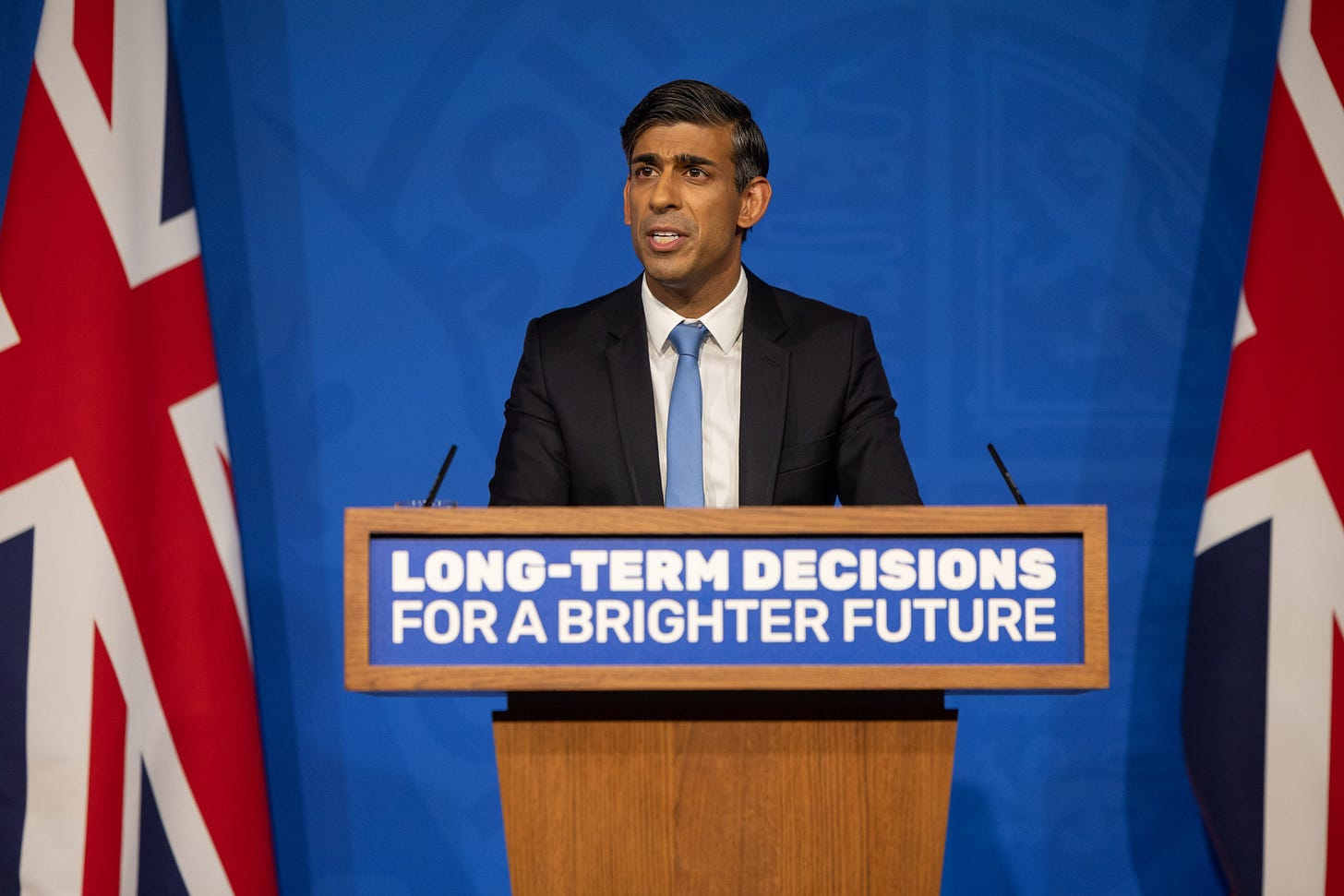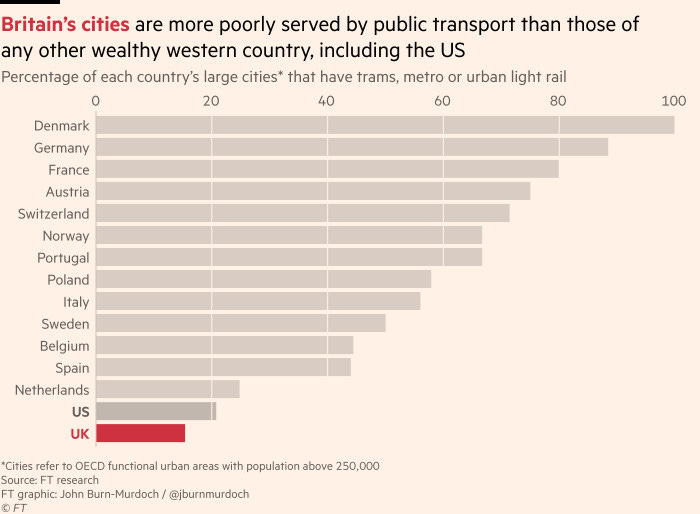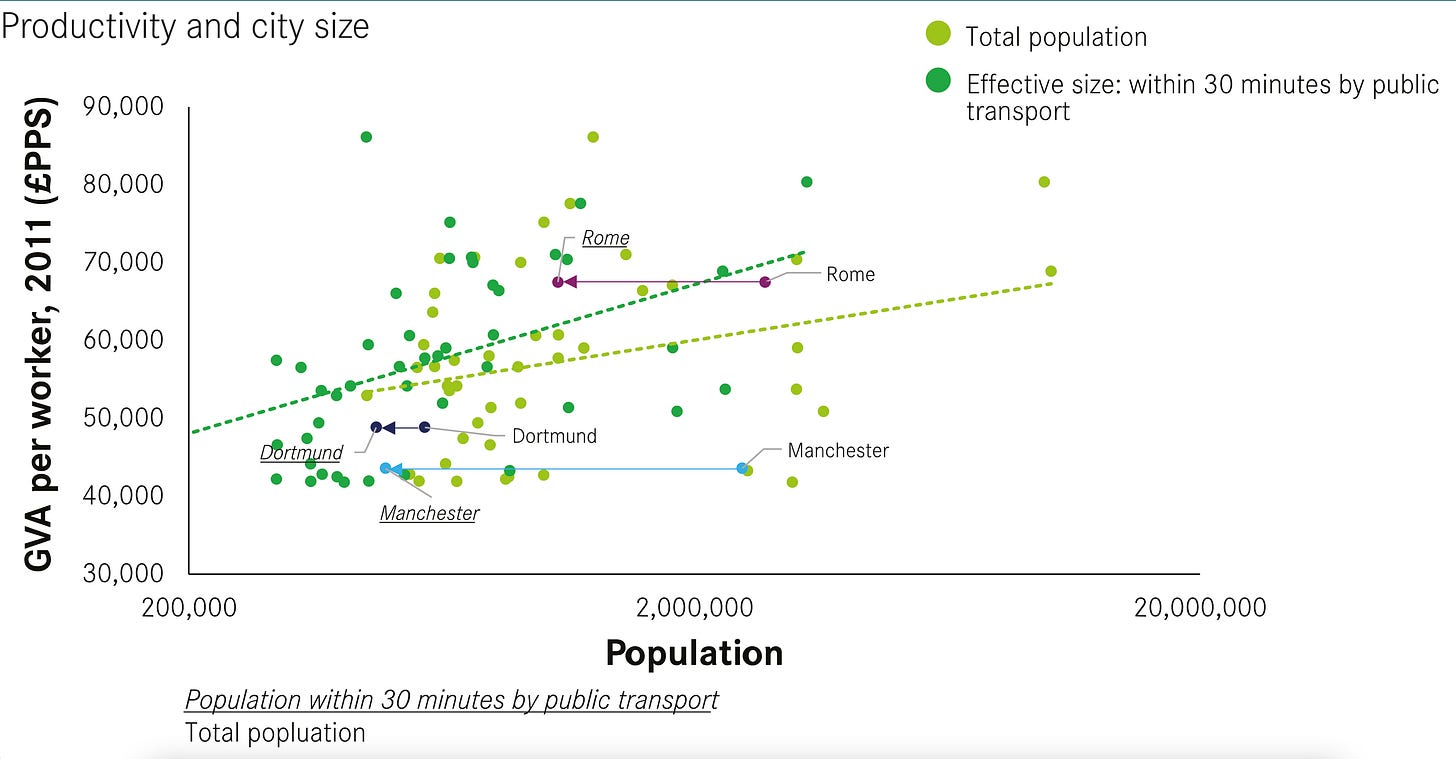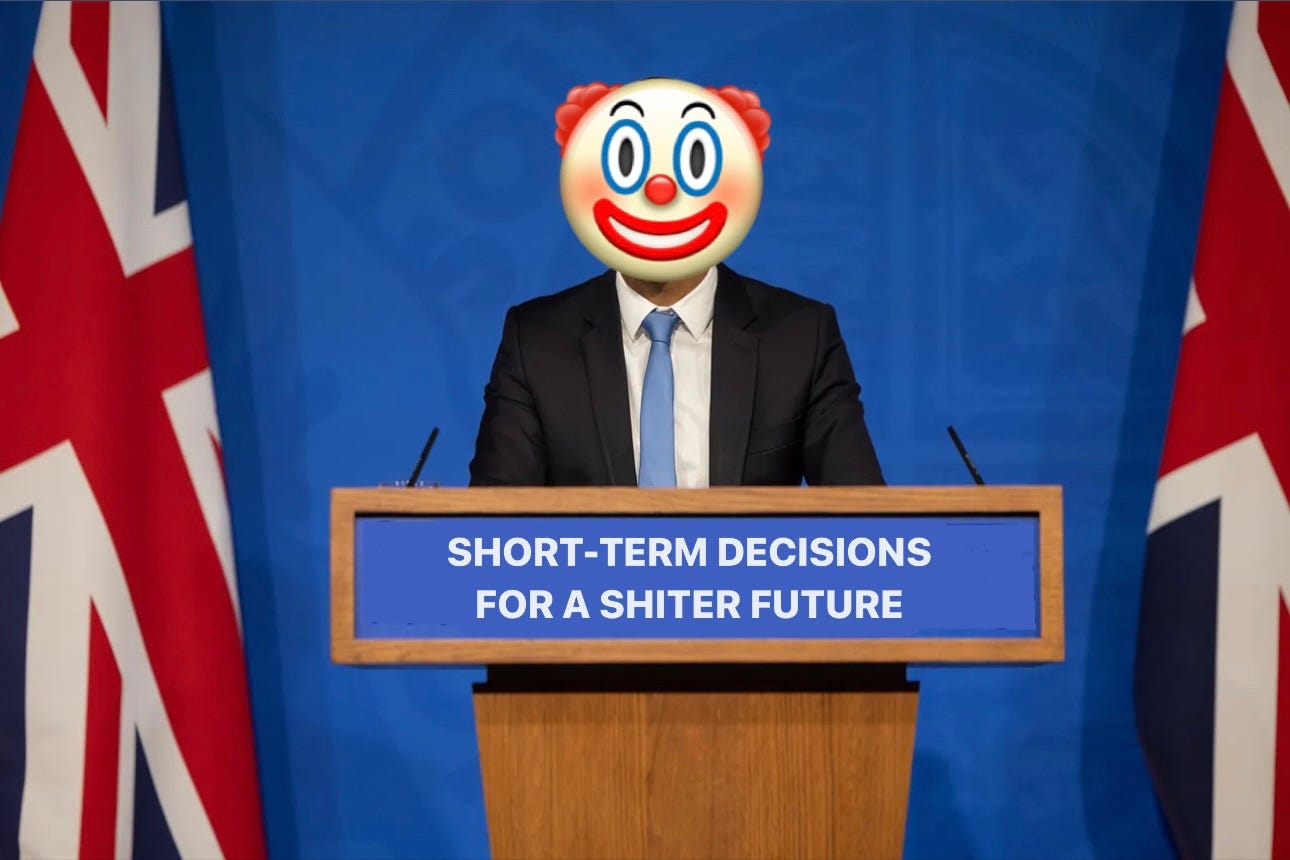It sits there, at the top of the podium, mocking us; brazen in its doublespeak. ‘Long-term decisions for a brighter future.’ Rishi Sunak has some brass neck using a slogan like that, while leading a party that treats tomorrow like a tiresome and irritating inconvenience.
One year on from Liz Truss, Sunak is sprinting to define his personal ‘ism’ in the short run up available to him before the next general election. Or as aides and advisors are characterising it: ‘Let Rishi be Rishi.’
No longer is he constrained by being Boris Johnson’s chancellor, or being forced by circumstance to mop up Truss’s mess. He’s now his own man. Anything we see now goes beyond values of staid managerialism and competence, it’s now the real deal — how he actually wants to be ideologically defined and perceived.
What clues do we have so far as to who the real Rishi is? Delaying the transition away from internal combustion engine vehicles by five years. Putting the future of HS2 beyond Birmingham in doubt, and potentially scrapping Euston as its southern terminus in favour of Old Oak Common — a random depot station in the outer suburbs of north west London. And an end to the ‘war on motorists,’ going after Low Traffic Neighbourhoods (LTNs), the 15 minute city concept of walkable neighbourhoods with local amenities, 20mph speed limits1, and creating a ‘national parking app2.’
‘One thing that I’ve realised: politicians, for too long, they always want to make short term decisions — take the easy way out — without thinking about how that is actually […] going to impact ordinary people. This war on motorists is the perfect example of that,’ he said.
If there is such a thing as the war on motorists, motorists are winning. The number of households without a car has dropped precipitously since the 1970s, and continues to fall. The percentage of households with access only to one car has held broadly steady, but this is only because the number of households with two or more cars is increasing.
And recent decades, the cost of rail and bus and coach journeys has risen far more quickly and substantially than the cost of motoring.
Meanwhile, the fuel duty escalator has been proudly frozen by each of the last seven conservative chancellors we have had over the last 13 years, making fuel duty 37% less expensive in real terms than in 2010. Does any of this look like a war on motorists?
As Himbonomics has previously argued, there are a great many reasons to actually wage such a war, given that cars make us more sedentary, obese, likely to die or be seriously injured in vehicular collisions, give us worse overall health outcomes, and make the very places we call home noisy, unsafe, polluted and ugly. Long-run focused policy should not be favourable to cars — Sunak is campaigning against the last 50 years of policy progress on urban and suburban design and living.
But reason this line is being trotted out by Sunak is that it’s a simple and effective ‘wedge issue,’ a topic that divides, or puts a ‘wedge’ between a united political front. Brexit is the prime example: it cut straight through the Labour electoral coalition of city liberals and suburban and rural ex-industrial voters in the North, pitting aligned economic values against misaligned social values.
Herein lies great danger for the Labour Party. Sunak’s fake war against the ‘war on motorists’ is a wedge issue trap. It’s demonstrably utter bollocks. But the very act of a shadow minister calling out this nonsense on, let’s say, the BBC’s Politics Live, means stepping straight into the Sunak bear trap, and appearing to go on the offensive against the 70 per cent of households that do have access to cars.
As reasonable as the minister might be, and as backed by evidence as they might be, they will be called out as backing higher motoring costs during a cost of living crisis, driving a wedge between Labour’s currently united voter coalition. It’s one thing for a minor newsletter for urbanism and growth nerds to point out that Sunak’s policymaking is a crock of shite — it’s quite another thing for a Labour MP to argue for the same publicly, and to then be unfavourably clipped by opposition staffers for negative campaigning. Labour should avoid feeding into this divisive campaigning narrative at all costs.
Sunak’s next policy announcement as part of the 2023 Conservative Party Conference was a rejection of cities — the country’s engines of growth: ‘For too long our economy has focused on cities — at the expense of towns,’ he said, adding: ‘We need to change our economic geography — away from cities.’
Reality doesn’t care about your wedge issues, Mr Sunak. By gunning for towns, you are limiting the already meagre growth of this country. All else being equal, the bigger the city, the more productive its average worker, with most productivity growth occurring in the densest areas.
The chart above demonstrating the relationship between city size and productivity only covers the United States — if we start looking at western European cities, we see an unusual relationship emerge. The relationship between city size and productivity holds — except for Britain.
Which leads us back to the poor state of Britain’s public transport infrastructure, which takes a back seat to cars. By the measure of whether or not cities above 250,000 people have a tram, metro or urban light rail system, the UK is one of the worst performing developed western nations. A war on motorists? The real war is against public transport.
So why doesn’t the productivity-city size relationship hold in Britain? The answer appears to lie in the poor provision of public — not private — transport in major British conurbations. Adjust for the number of people able to visit city centres within 30 minutes by public transport, and the correlation becomes much stronger. This supports the theory of urban agglomeration that the meeting of minds and the sharing of goods, services and ideas is made possibly only by the mixing and efficiencies that well-connected cities enable.
But reality isn’t the priority right now — cars are, alongside a bunch of discordant policies that sound like they were stolen from closing time at the Dog and Duck. Sunak is is prioritising superficial, populist and short-term wedge issues that speak to the politics of the next 6-12 months. And for what, another 5 years of this shower?
He is not bringing forward policies to make the country a better, more productive, richer place in the long run — with the ability to fund the state services the public desires. Labour would only take the credit, anyway.
Instead, Sunak is salami slicing the few public infrastructure projects that remain (like HS2), in the process removing the benefits while retaining the costs. He’s backing car-dependent uglification of our cities and suburbs, against our long-run health interests. He’s backing the convenience of the past.
All under the banner of ‘Long-term decisions for a brighter future.’ It’s laughable. If he were serious about long-term decisions for a brighter future, the first policy pledge would be a huge increase in housebuilding, and the second would be on investing in public transport infrastructure. I won’t hold my breath.
If you enjoyed this piece, you might enjoy these other articles on what Sunak is all about:
Will the real Rishi Sunak please stand up?
There’s something almost too perfect about our (latest) new Prime Minister, Rishi Sunak. The slim cut, dark navy suits, always paired with a crisp, brilliant white shirt and suitably tasteful tie. The slicked back, regimented hair. The sunny Californian optimism, enthusiasm and speech cadence. Perhaps it’s the sheer teetotal contrast with Liz Truss’s sh…
Rishi Sunak is: Barbie 💝
The Tories are already sitting on the green Opposition benches, judging by how they speak to the media, parliament and even to themselves. The airwaves are filled not with ministers’ on-message soliloquies to Conservative policy success, focused attacks on Labour weaknesses and tomorrow’s ambitions, but confused lamentations on institutional failures of…
Why is the Prime Minister getting involved in the minutiæ of local government speed regulations? You’re the leader of this country — concentrate on something that matters, not fourth order regional politics!
Ok fine, a national parking app with a unified payment system is actually not a terrible idea.














